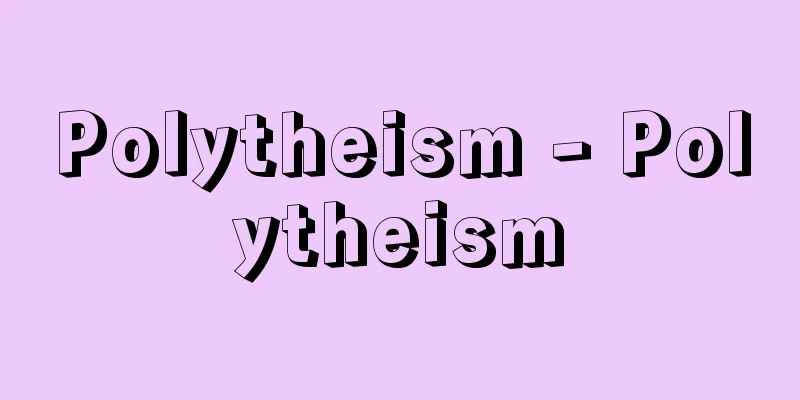Housewife - Shufu

|
A woman who manages the household. As families that have completely lost their productive function (family business) have become commonplace, so-called "housewives" who stay at home and devote themselves solely to housework and child rearing have become widespread. The term "housewife" has been given a clear meaning in this situation as a woman who is solely responsible for housework, and has come to be seen as a social stratum of its own. This is also the basis for the formation of organizations calling themselves the Housewives Union and the Consumer Union. [Toshimi Takeuchi] Housewife folkloreThe role of the housewife also existed in traditional families that were centered around family business and developed within the framework of the occupational class system. Succession to the samurai family was limited to males, and their authority was strong, so wives and daughters had a hidden presence as ladies' wives and concubines. However, apart from the daimyo class who had a complex system of "Ooku" (inner palace), ordinary samurai in the early modern period lived entirely on stipends, and the role of wives and daughters to "rule the household" was emphasized in line with Confucian ethics. As the old names such as Okami, Oue, Okata, Omae, Enushi, Ietoji (housekeeper), and Yuwaraji (house master) indicate, wives and daughters of merchants and upper-class farmers were responsible for managing the household, and were in charge of managing the so-called "inner and inner" women. They had authority over all aspects of life, including food, clothing, and housing, and in many places, what could be called "housewife rights" had been customarily established. In some places, a ritual called "shakushi-watashi" or "herawatashi" was held in which a mother-in-law (former housewife) would hand over her authority to her daughter-in-law on the night of the New Year, placing a spatula on a pot lid. "Distributing food" was the most important authority of a housewife, and the spatula was, so to speak, a symbol of housewife rights. Was it an implicit coincidence that a ladle was brought to the Housewives' Association demonstration? Furthermore, large merchants and farming families that were former landowners had many employees and visitors in addition to their families, and dealing with them appropriately was considered just as important as managing the household. The work of housewives has long been highly valued in supporting the family's fortunes from within. In particular, wives and daughters of fishing families managed all the household chores. The lives of the Edo tenement residents (those who were craftsmen) who were the protagonists of rakugo stories also relied solely on the wives and daughters to run all the household chores. [Toshimi Takeuchi] Problems of modern housewivesThe proportion of full-time housewives (housewives who do not have paid work and focus on housework and child rearing while receiving their husband's salary) peaked in the 1970s, after the high economic growth period, and has since gradually declined. In the wake of the global trend since the International Women's Year in 1975, which saw the review of gender role division and the enforcement of the Equal Employment Opportunity Law, and the need for women to participate equally with men in all fields, more and more people do not consider full-time housewives desirable. The number of women who wish to continue working after marriage and childbirth is increasing. In addition, against the backdrop of the economic recession and the rise in the number of people with higher education since the 1990s, the number of housewives who have become unemployed by choice and who participate in society and achieve self-realization through local activities such as volunteering, workers' collectives (organizations that independently manage labor and management in order to work in a humane way), and consumer movements is also increasing. On the other hand, there are men who are choosing to be "house husbands" as a new lifestyle, and although the numbers are small, there are husbands who take parental leave; the image of the housewife and family that was created in the 1960s is changing significantly. However, in today's Japanese economic and social system, full-time housewives, especially the wives of salaried workers, are eligible for various preferential treatment by becoming dependents of their husbands, which creates an unfair burden for women in general. In other words, if their annual income is 1.03 million yen or less, they are considered dependents of their husbands and are exempt from taxation under the spousal deduction and special spousal deduction. If their annual income is less than 1.3 million yen, they do not have to pay pension or medical insurance premiums, and can receive spousal allowances from their husband's workplace. Therefore, even if they are working, housewives tend to only work part-time within the scope of the above preferential treatment. There is also criticism that this "full-time housewife in the tax system" is a breeding ground for low-wage part-time work. On the other hand, a major issue that affects all housewives, not just full-time housewives, is the issue of nursing care in a society with a declining birthrate and an aging population. Although the public nursing care insurance system was established in 2000 and nursing care leave is legally recognized, nursing care has not yet been fully socialized and is still seen as the job of the housewife within the family. Due to the heavy burden, many housewives suffer from health problems and are forced to quit their jobs. [Yasuko Daimon] "Kuraishi Atsuko, 'Yanagita Kunio and his View of Women - with a Focus on Housewives' Rights' (1995, Sanichi Shobo)" ▽ "Hannan University Women's Studies Association (ed.), 'Perspectives on Women's Studies' (1996, Nakanishiya Publishing)" ▽ "Ochiai Emiko, 'Towards the 21st Century Family', New Edition (1997, Yuhikaku)" ▽ "Kaneko Sachiko, 'The Genealogy of Modern Japanese Feminist Theory' (1999, Fuji Publishing)" ▽ "Kasuga Kisuyo, 'Sociology of Nursing Care Issues' (2001, Iwanami Shoten)" [References] | | | | |Source: Shogakukan Encyclopedia Nipponica About Encyclopedia Nipponica Information | Legend |
|
家事の管理にあたる女性。生産的機能(家業)をまったく失った家族が一般化したことにより、家庭にとどまってもっぱら家事・育児に専念するいわゆる「家庭婦人」を広く生じた。主婦の名称はこうした事態における家事専担者として明確な意義づけを与えられ、一つの社会層とみられる形を呈してもいる。主婦連合、消費者連合などと銘打つ団体の結成基盤もそこにある。 [竹内利美] 主婦の民俗職能身分制の枠内で展開してきた家業中心の伝統的家族にも主婦の役割は存在していた。武家の継承は男子に限られ、その権限も強大で、妻女は奥方、内儀として陰の存在ではあったが、複雑な機構の「大奥」制度をもつ大名層は別として、一般の近世武家はまったくの俸禄(ほうろく)生活者となり、もっぱら「内を治める」妻女の役割が儒教的倫理に沿って強調もされた。 商家や上層農家の妻女はオカミ、オウエ、オカタ、オマエ、あるいはエヌシ、イエトウジ(家刀自)、ユワラジ(家主)などの古い呼び名が示すように、家事管理の責任者として、いわゆる「内方、奥方」の「取り仕切り」にあたり、食事をはじめ衣服・居住など万般の生活に権限をもち、「主婦権」ともいうべきものが慣行的にできあがっていた所も多い。「杓子(しゃくし)わたし」「へらわたし」といって、姑(しゅうとめ)(旧主婦)が嫁にその権限を譲り渡すにあたり、年取りの夜、杓子(へら)を鍋蓋(なべぶた)にのせて引き渡す儀礼を行ってきた所もある。「食事の配分」が主婦のいちばん重い権限であり、飯杓子(へら)はいわば主婦権の象徴であった。主婦連のデモに杓子を持ち出したのも暗黙の符合であろうか。また「大店(おおだな)」の商家や旧地主の農家は、家族のほかに多くの雇い人や出入り人を抱え、そうした人々への適切な応対も、家事の管理同様重くみられた。家運を内から支えるうえで主婦の働きは古くから実質上大きな評価を与えられてもいた。とくに漁家の妻女などは家事いっさいをもっぱら切り盛りした。落語の主人公の江戸長屋の住民(出職人の類)の生活もまた、家事いっさいの繰り回しはもっぱら妻女の手に依存していた。 [竹内利美] 現代の主婦に関する諸問題主婦のなかにおける専業主婦(夫の賃金収入の下で、自らは有償の仕事をもたず、家事・育児に専念する主婦)の割合は、高度成長期を経た1970年代にピークに達し、その後徐々に低下した。75年の「国際婦人年」以降の世界的潮流のなかで確認された性別役割分業の見直し、男女雇用機会均等法の施行など、すべての分野に女性が男性と同等に参加することの必要性が叫ばれるなかで、専業主婦を望ましいとしない人々が増えた。結婚、出産後も働き続けたいという希望の女性は増加している。また、90年代以降の経済不況、高学歴化を背景に、自ら選択的失業主婦となり、ボランティアやワーカーズ・コレクティブ(人間らしい働き方をするために、労働と経営を自主的に管理する事業体)、消費者運動などの地域活動を通して社会に参加し、自己実現を果たす主婦も増加している。逆に、男性のなかからは新しい生き方として「主夫」を選択する男性も現れ、数は少ないものの育児休業をとる夫が登場するなど、1960年代につくられた主婦像、家族像は大きく変化してきている。 しかし、今日の日本の経済社会システムのなかでは、専業主婦、ことにサラリーマンの妻は、夫の被扶養者となることでさまざまな優遇措置を受ける仕組みとなっているので、女性間全体における負担の不公平という状況を生み出している。すなわち、年収103万円以下であるならば夫の被扶養者であるとみなされ配偶者控除と配偶者特別控除が適用されて非課税となる。年収130万円未満であれば、年金や医療保険の保険料を払わなくてすむうえに、夫の勤務先より配偶者手当を受けるなどの措置がある。そのため、共働きの主婦とはいっても、以上の優遇を受ける範囲内でのパート労働にとどまる傾向はやまない。この「税制上の専業主婦」が、パート低賃金労働の温床となっているという批判もある。 一方、専業主婦に限らず主婦全体に共通する大きな問題としては、少子高齢化社会における介護の問題がある。介護は、2000年(平成12)に公的介護保険制度ができ、介護休業が法的に認められているものの、介護の社会化はいまだ十分果たされておらず、もっぱら家族のなかの主婦の仕事として認識されている。かかる負担の大きさゆえに、健康を害したり、離職を余儀なくされる主婦も多い。 [大門泰子] 『倉石あつ子著『柳田国男と女性観――主婦権を中心として』(1995・三一書房)』▽『阪南大学女性学研究会編『女性学の視座』(1996・ナカニシヤ出版)』▽『落合恵美子著『21世紀家族へ』新版(1997・有斐閣)』▽『金子幸子著『近代日本女性論の系譜』(1999・不二出版)』▽『春日キスヨ著『介護問題の社会学』(2001・岩波書店)』 [参照項目] | | | | |出典 小学館 日本大百科全書(ニッポニカ)日本大百科全書(ニッポニカ)について 情報 | 凡例 |
Recommend
Epirus Empire - Epirus (English spelling)
A Greek state (1204-1340) established by Michael I...
Complete metamorphosis
A type of metamorphosis in insects, in which a lar...
Akama Shrine
It is located in Amidaji-cho, Shimonoseki City, Y...
The Concordance of Umar
...With the establishment of Islam, they, along w...
Coprinus atramentarius (English spelling)
Basidiomycetes, order Matsutake, family Coprinus. ...
Antwerp [province] - Antwerp
…In the Middle Ages, it was the westernmost state...
Couple
〘 noun 〙 (avec meaning "together") 1. A ...
Warehouse receipts - Kuranishoken
A type of warehouse receipt. A warehouse operator...
Kannouden - Kannouden
…In Tara Manor in Wakasa Province, the Deputy Min...
Friedländer (English spelling) Max Jacob Friedländer
German art historian. He studied at museums in Mu...
Mitsui Zaibatsu
One of the most representative conglomerates in m...
The Five Men of the Kyoho Era
...In the Tenpo period (1830-44), his exploits be...
Dogen - Dogen
A Soto sect monk in the Kamakura period. Also kno...
Primary follicle
…Oocytes remain dormant in the ovaries in the pro...
Hateruma Island
The southernmost island in the Yaeyama Islands, O...









